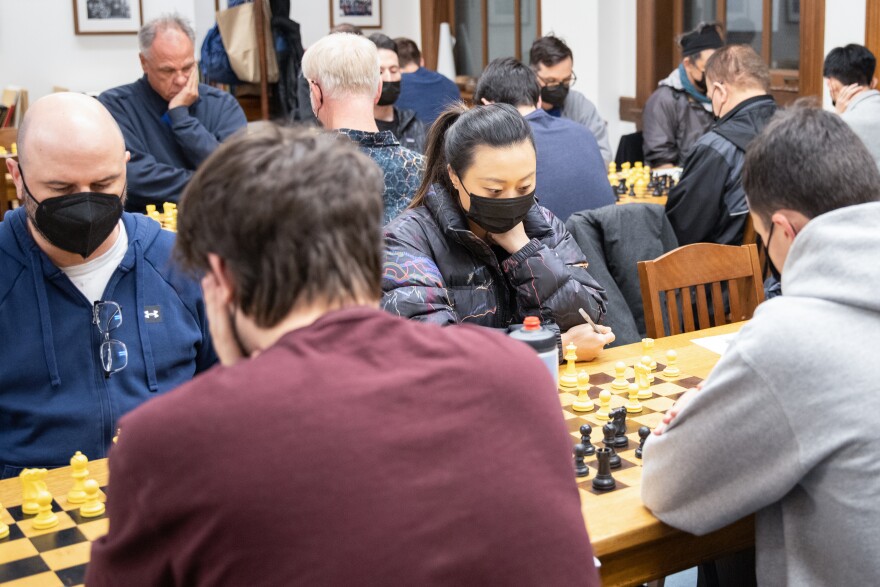This story aired in the May 2, 2023 episode of Crosscurrents.
Click the play button above to listen to the story.
On a cold Tuesday night, two blocks from Union Square, people start lining up to enter an old building off Post Street named the Mechanics Institute. But inside, there is a research library and a competition hall for playing chess on the top floor.
Chess Program Manager Alex Robins says there is so much history since they have been operating since 1854, but tonight is the big night. It's the Tuesday night marathon.
“This is the longest-running weekly tournament in the United States – it's been going since 1972,” Robins said. “We've actually been doing really well on attendance lately – all of our tournaments are selling out in advance.”
That is the beauty of chess. A sudden resurgence of the 1,400-year-old game can only be explained by the COVID-19 pandemic causing everyone to stay home, chess tournaments resorting to function online, and the premiere of the Netflix series Queen’s Gambit, which told the story of a female chess prodigy becoming a chess master during the Cold War.
Only minutes before the tournament started, the Chess players listened to the resident Chess master, Paul Whitehead, lecture on a recent international game played by Armenian chess grandmaster Levon Aronian. Mr. Whitehead displays strategy and mistakes made throughout the game on a demonstration board, where chess pieces hang on, giving a bird's-eye view of the carnage.
Whitehead said that the Chess grandmaster was setting up his pieces as a dragon variation of the Sicilian Defense, a known set of moves that put most of your chess pieces on the frontline. Learning from past games helps new and professional players turn the tide to beat their opponents.

This classroom environment allows regulars to ask Paul Whitehead, “What if Levon made a daring move?”
“A lot of times taking action can lead you into trouble,” Whitehead, who became a Master at a young age, said. “Being patient is sometimes the thing to do.”
When the lecture ends, more members pour into the room, packing the hall. Most of the chess players are male, and they vary in age. Some players are as young as eight, some as old as 80. But there were some women players scattered around the tables.
The Institute wants to include women and children from lower economic backgrounds so they learn to play chess. Because, despite the recent resurgence, there are still some barriers in the Chess world since the game is still male-dominated or needs a lot of funding to play matches to be ranked and play in tournaments.

Alex said to really see the Mechanics Institute at work, interested folk could see the Scholastic Chess Championship, where more than 300 students from all over San Francisco would compete at the San Francisco County Fair building in Golden Gate Park.

Before the competition started, you could see young kids reading up on chess strategies or trying to memorize gambits, a set of famous opening moves in which players would trap their opponents by giving up a piece for something better.
Allysa Stone, Senior Director of Programs and Community Engagement at the Mechanics Institute gave the opening speech that kicked off the event.
Stone said, ”It’s been four years since we've been able to bring the championship back.”
There were tables set for Kindergarteners to 12th graders who could compete in unranked games, which students play amongst their peers, and ranked games with no age range, just skill level.
Wilson Skinner, Special Educator at Francisco Middle School, said, I think for Chess Club at this age, it can feel like a place to be.
“I know we run our club as 'very open,'” Skinner said. “It gives a lot of kids who need somewhere to go at lunch or made a ton of friendships a place to find community.”
Skinner’s side hustle is running the Chess club and team. His motivation is to have his students bond together during tournaments and also in academic settings. But Skinner also has a challenge to face.

“My challenge is how do I get more girls to play, "Skinner said. “We’re kind of seeing them recognize their power feels empowering and exciting.”
Skinner added that in the Francisco Middle School team of three, two of the strongest players are girls. One of them, Vicky Lee, came out of the tournament hall to catch up with the team after her game. She lost in an earlier match but was in great spirits.
“I'm really glad to come here,” Vicky Lee said. “There's a lot of great people, and I learned a lot from my first game.”
Just for Lee to practice for the tournament, she used a mix of Online Chess matches from Chess.com and their Chess puzzles, which throw the player into random scenarios to find a quicker checkmate. But, mostly Vicky credits attending the club and interacting with people.

“You can think of all the dynamics and ways you can move a piece,” Vicky Lee said. “It's kind of really like how we experience life with a lot of moves, except it's on a chess board.”
Win or lose, the next generation of Chess players will be okay. As long as they do not leave themselves open for a checkmate.
EDITOR'S NOTE: A previous version of this story contained errors that have been corrected. The story at the end states that the Mechanic's Institute offers free chess classes every Monday, but their free classes are offered every Wednesday.



